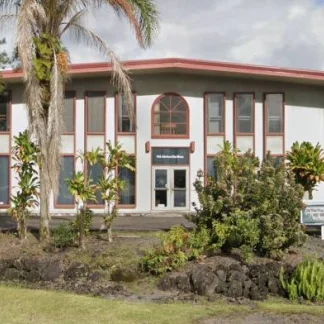VA Pacific Islands Health Care System - Hilo CBOC
Hilo CBOC, part of VA Pacific Islands Health Care System, provides primary healt...
Ku Aloha Ola Mau in Hilo, HI is an accredited drug and alcohol addiction rehab center that provides treatment for substance use disorders including heroin, cocaine, methamphetamine, or a combination.
Through comprehensive assessments, Ku Aloha Ola Mau offers a continuum of care that includes the following:
To address the multifaceted nature of opioid addiction, Ku Aloha Ola Mau extends medically assisted treatment (MAT). This strategic approach combines medications, such as methadone, with counseling and behavioral therapies to offer a comprehensive path to recovery.
The outpatient treatment program at the center is meticulously designed for individuals who wish to receive therapeutic interventions without the need for residential admission. It emphasizes counseling, group dynamics, and individualized therapeutic activities to support recovery.
Understanding the significance of timely intervention, Ku Aloha Ola Mau’s Early Intervention program seeks to address addiction at its nascent stages. By providing the necessary guidance, education, and support, this initiative aims to prevent further progression of substance-related issues.
Care coordination services at the center ensure that individuals receive tailored treatments, referrals, and resources. Certified counselors provide assessment, case management, and collaboration with providers in the community.
Emphasizing the importance of sustained recovery, the continuing care program offers post-treatment support. It ensures that individuals have access to resources, counseling, and community support to maintain sobriety.
Contact us for more information: (808) 961-6822

Connect with Ku Aloha Ola Mau by calling their admissions team directly.
(808) 961-6822 Website Get DirectionsThe Commission on Accreditation of Rehabilitation Facilities (CARF) is a non-profit organization that specifically accredits rehab organizations. Founded in 1966, CARF's, mission is to help service providers like rehab facilities maintain high standards of care.
CARF Accreditation: Yes
Cognitive Behavioral Therapy (CBT) is a therapy modality that focuses on the relationship between one's thoughts, feelings, and behaviors. It is used to establish and allow for healthy responses to thoughts and feelings (instead of unhealthy responses, like using drugs or alcohol). CBT has been proven effective for recovering addicts of all kinds, and is used to strengthen a patient's own self-awareness and ability to self-regulate. CBT allows individuals to monitor their own emotional state, become more adept at communicating with others, and manage stress without needing to engage in substance abuse.
Research clearly demonstrates that recovery is far more successful and sustainable when loved ones like family members participate in rehab and substance abuse treatment. Genetic factors may be at play when it comes to drug and alcohol addiction, as well as mental health issues. Family dynamics often play a critical role in addiction triggers, and if properly educated, family members can be a strong source of support when it comes to rehabilitation.
Group therapy is any therapeutic work that happens in a group (not one-on-one). There are a number of different group therapy modalities, including support groups, experiential therapy, psycho-education, and more. Group therapy involves treatment as well as processing interaction between group members.
In individual therapy, a patient meets one-on-one with a trained psychologist or counselor. Therapy is a pivotal part of effective substance abuse treatment, as it often covers root causes of addiction, including challenges faced by the patient in their social, family, and work/school life.
Research clearly demonstrates that recovery is far more successful and sustainable when loved ones like family members participate in rehab and substance abuse treatment. Genetic factors may be at play when it comes to drug and alcohol addiction, as well as mental health issues. Family dynamics often play a critical role in addiction triggers, and if properly educated, family members can be a strong source of support when it comes to rehabilitation.
Group therapy is any therapeutic work that happens in a group (not one-on-one). There are a number of different group therapy modalities, including support groups, experiential therapy, psycho-education, and more. Group therapy involves treatment as well as processing interaction between group members.
In individual therapy, a patient meets one-on-one with a trained psychologist or counselor. Therapy is a pivotal part of effective substance abuse treatment, as it often covers root causes of addiction, including challenges faced by the patient in their social, family, and work/school life.
Group therapy is any therapeutic work that happens in a group (not one-on-one). There are a number of different group therapy modalities, including support groups, experiential therapy, psycho-education, and more. Group therapy involves treatment as well as processing interaction between group members.
In individual therapy, a patient meets one-on-one with a trained psychologist or counselor. Therapy is a pivotal part of effective substance abuse treatment, as it often covers root causes of addiction, including challenges faced by the patient in their social, family, and work/school life.
In individual therapy, a patient meets one-on-one with a trained psychologist or counselor. Therapy is a pivotal part of effective substance abuse treatment, as it often covers root causes of addiction, including challenges faced by the patient in their social, family, and work/school life.
Hilo CBOC, part of VA Pacific Islands Health Care System, provides primary healt...
Big Island Substance Abuse Council - Ka Wahi Ola Hou offers inpatient treatment ...
Big Island Substance Abuse Council - Waiakea School is a non-profit rehab locate...
Big Island Substance Abuse Council - Keaau Middle School is a non-profit rehab l...